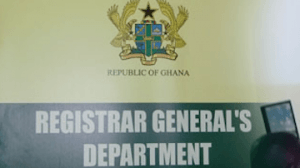Registrar-General calls for awareness on Intellectual Property Rights
 Mrs Jemima Oware, Acting Registrar General, has expressed the need for increased awareness creation among Ghanaians on Intellectual Property Rights (IPR) to reduce the number of infringements.
Mrs Jemima Oware, Acting Registrar General, has expressed the need for increased awareness creation among Ghanaians on Intellectual Property Rights (IPR) to reduce the number of infringements.
She noted that the number of local trade applications and frequently reported infringements show that IPR awareness in Ghana is not adequate.
According to her, records at the National Industrial Patent Office indicated that more than 70 per cent of the 3034 trademark applications receive by the Registrar General’s Department in 2014, were foreign owned, with only 970, representing 32 per cent of the total number of applications being locally owned.
She was speaking at the opening of the United States Patent and Trademarks Office (USPTO) Africa Regional Intellectual Property Enforcement Workshop in Accra.
“It has been argued that IPR awareness in Ghana, like other developing countries is inadequate. It is therefore not surprising that we have fewer local applications and frequent reported infringements. It is believed that adequate awareness could contribute to a reduction in e infringement of intellectual property rights,” she stated.
She explained that most of those who infringe on intellectual property rights, such as traders who sell pirate textiles from China, were mostly innocent infringers, which buttressed the argument that there is inadequate awareness or education on IPRs in Ghana.
Mrs Oware said Ghana, in a bid to tackle the issue from angles, is in the process of amending its Intellectual Property laws to include among others more stringent and punitive enforcement provisions.
“For example, Ghana’s Trademarks Act was amended in 2014 to include non – bailable provisions on counterfeit of certain goods, particularly, food, drugs, medical devices, cosmetics, household chemicals, electrical appliances, vehicle, and machine parts. In fact, such activities according to the Trademarks Act (as amended) are criminal in nature,” she said.
There has also been some IP training programmes for IP administrators, judges and staff of the enforcement agencies, often organised by the Registrar – General’s Department, the African Regional Intellectual Property Organisation, (ARIPO) and the World Intellectual Property Organisation (WIPO) as well as the USPTO, Korea Patent Office and Japan Patent Office.
She urged participants at the three-day workshop to make relevant recommendations to address the challenges in the IP systems in their countries for the benefit of their people.
Madam Melinda Tabler-Stone, Chargé d’Affaires at the US Embassy in Accra noted that the protection and enforcement of intellectual property rights laws and policy are increasingly important in today’s global economy, both to foster innovation and more importantly, to protect consumers.
She said the existence of legal frameworks are only the beginning as it is of limited economic and social value if creators, inventors, and businesses could not adequately enforce their rights, adding that entrepreneurs like Shirley Frimpong-Manso, the Ghanaian Film Director, Writer, Producer, and Founder and CEO of Sparrow Productions and her contemporaries relied on enforcement of IP laws to protect their work.
“It is the lawful sale and screening of her work that finances the next project. She and her contemporaries rely on the people in this room to enforce IP laws, so that their work product is protected and they are able to continue to innovate and invest in the arts,” she stated.
Ms Tabler-Stone said the protection of intellectual property has the potential to stimulate further research and development of existing innovation and serve as an important tool to improve the national and regional competitiveness of businesses resulting in new job creation, economic growth, and societal development.
She said a robust national IPR enforcement mechanism could be a catalyst to attract foreign direct investment, especially since investors such as those from United State would bypass markets that do not adequately protect the intellectual property they have worked hard to create.
“I’m proud to say the United States is home to many of the world’s recent developments in technology, pharmaceuticals, medical devices, entertainment, and consumer products. We want the creators of these technologies and content to be present in Ghana and other African nations, but they will not make the investment unless they are assured that their property is appropriately protected.”
She noted that the participants, who were intellectual property stakeholders among the ARIPO member States, have a role to play in making public policy, setting organisational norms, upholding the rule of law, and educating consumers.
She expressed the hope that exchange ideas and experiences that would lead to improved approaches, development of best practices, and improved effectiveness of their IP organisations.
Source: GNA
